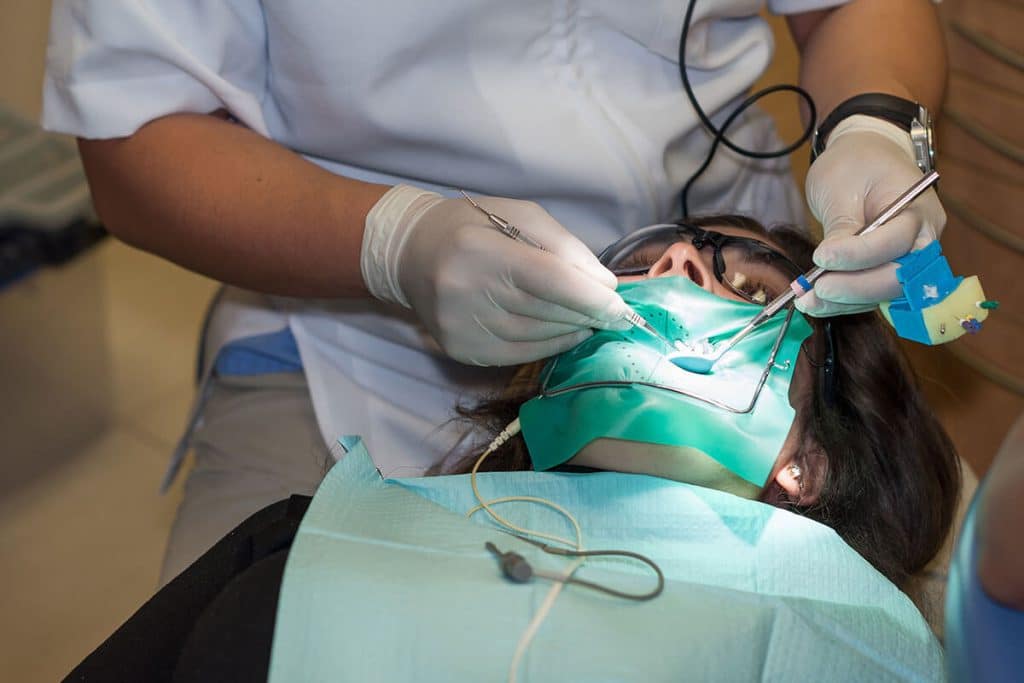Root Canal vs Extraction: What To Consider

Root canal or extraction—many people hope never to be presented with this choice, but it is actually an incredibly common situation. Both treatments are solutions for teeth with extensive damage or decay. If your dentist has given you these options, it is important to understand exactly what is involved with each choice.
Root Canal: Saving the Tooth
If the pulp (dental nerve) layer of your tooth is damaged, diseased, or even dead, a root canal is the only way to save the tooth. We will numb the tooth with local anesthetic, and then create a small opening into the tooth, exposing the canals. We use 3D imaging CBCT scans and microscopes, when needed, to accomplish it.
Using special tools, we then clean out all decay and damaged tissue, and disinfect the canals. We will fill the canals with a biocompatible material known as gutta-percha. This seals the tooth against infection and fills in the canal space. The tooth is then restored for further protection and functionality by your dentist.
Most people experience little discomfort after a root canal procedure. Over the counter pain relievers may be used to combat any discomfort you feel. We are available 24/7 if you need any post operative care.
Tooth Extraction: Letting the Tooth Go
Like a root canal, a tooth extraction begins with a local anesthetic to completely numb the area. Your dentist will then use special tools to loosen the tooth and pull it out. You will feel some pressure and hear some loud cracking and popping sounds, but it should not hurt.
After a tooth extraction, it is normal to bleed, so you will be sent home with gauze in your mouth to bite down on for 30-45 minutes or as instructed. You may experience some oozing or light bleeding for the next 24 hours or so. Minor facial swelling and bruising are not uncommon, especially when a back tooth is extracted. Using an ice pack for 15-20 minutes at a time for the first 24-48 hours can help minimize these issues.
Some pain is not unusual after a tooth extraction. Your dentist might give you a prescription for a pain reliever, which you should take as directed to stay ahead of the pain. Some people also choose to manage the pain with over the counter pain relievers such as Tylenol or Advil.
Most people feel significantly better within two or three days, but be aware that it can take two weeks or more for the extraction site to fully heal. Carefully follow your dentist’s instructions, especially in regards to spitting, drinking through a straw, eating, and brushing your teeth.
After a tooth extraction heals, it is important to replace the tooth. Otherwise, your other teeth could shift out of place. Depending on where the tooth was in your mouth, you might also have trouble speaking or chewing without it. There are many replacement options, from dental bridges to partial dentures to dental implants. Your dentist will review the choices with you and help you select the one that best fits your needs, goals, and budget.
Final Verdict: Save the Tooth if Possible
Although a missing tooth is easy to replace with modern dentistry, it will never be the same as your own natural tooth. In addition, healing from an extraction takes longer and is often more painful than healing from a root canal, and pulling the tooth means even more dental procedures and healing time to replace it later.
Still, pulling the tooth might be right for some situations. Some teeth are simply too far gone to save, even with a root canal. Some people have had very bad teeth for a long time, and know from experience that a root canal will only delay the inevitable—that the tooth, or more likely multiple teeth—will need to come out eventually. While this situation is rare, and modern dental technology is making it easier and easier to save even problematic teeth, ultimately the decision is yours. Talk it over with your dentist, take some time to really consider both options, and make the choice that you feel best about.
Ready to Get Started?
If you need a root canal from an endodontist you can trust, contact North Shore & Brookline Endodontics today at the location that is most convenient for you.
Recent Posts
About
Welcome to North Shore & Brookline Endodontics! Service is at the core of everything we do. Our Greater Boston dental team work together to provide a warm, comfortable and relaxing environment.
